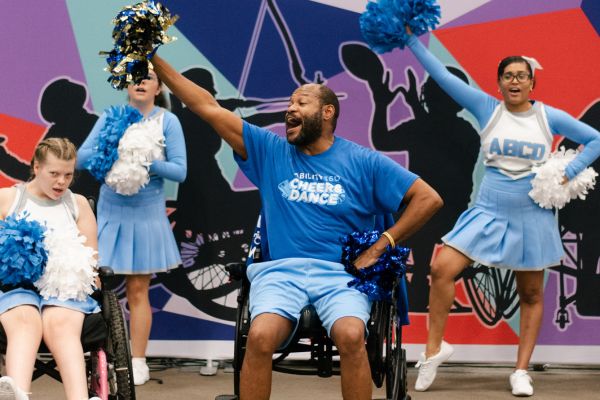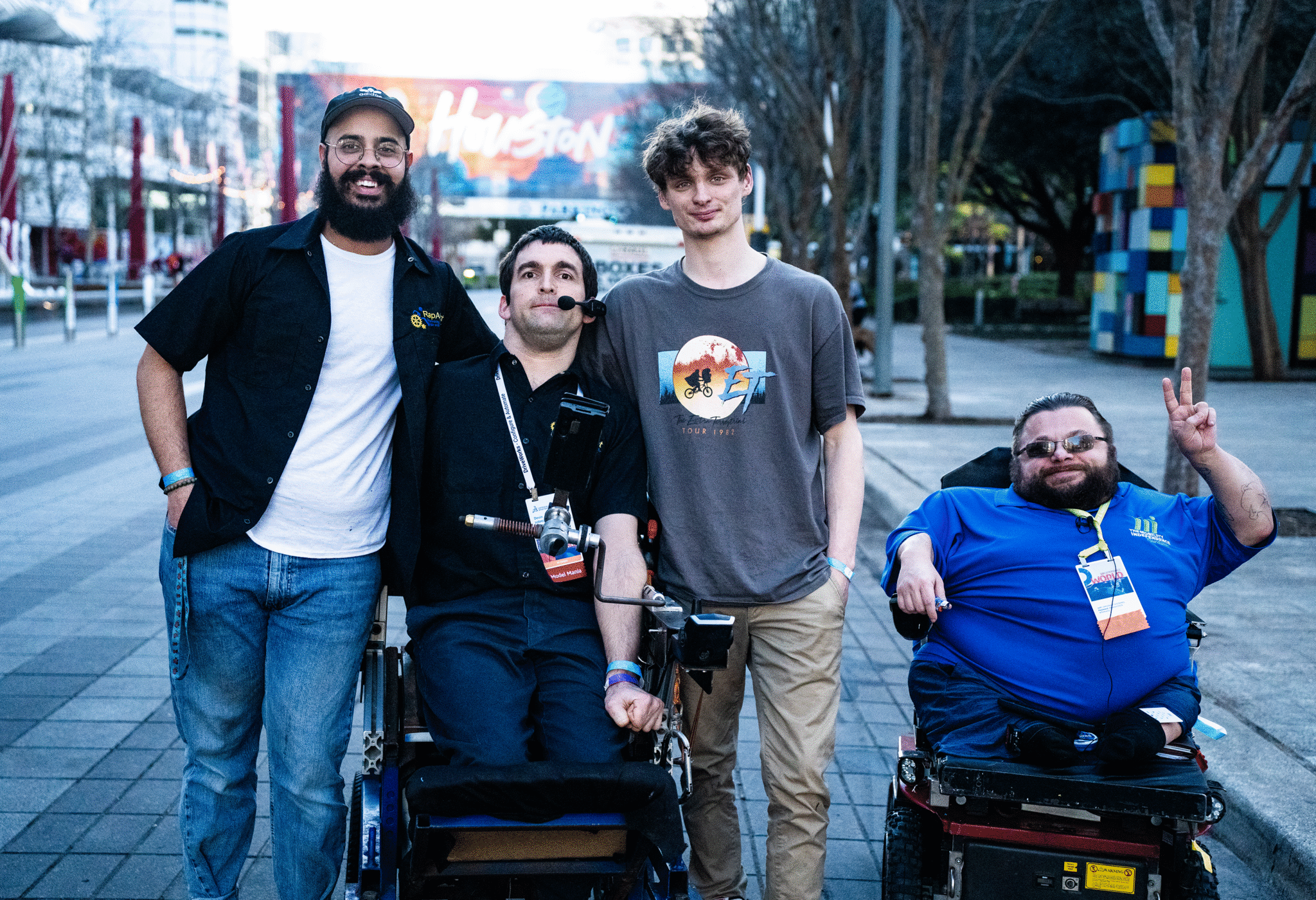Many people associate having a disability with weakness. With suffering. Or with inability.
But in fact, I would argue that sometimes having a disability (as with experiencing other adversities) can actually foster and promote a trait called “grit.” We learn a mental toughness or tenacity—even what people used to call “moxie.” These are important assets in leadership that can be cultivated over time and set one up for success and perseverance. But you really only develop these traits by experiencing some sort of challenge or adversity.
Anyone who has a disability knows how life-changing it can be. But, change is how we learn to adapt. And not just adapt… but THRIVE.
Those of us who have learned to successfully adapt to our disabilities have learned a lot that we can teach others about overcoming challenges.
I was born with my disability. I often think about what I would say to myself if I could travel back in time and reassure a younger version of myself that everything would turn out just fine?
I’ve found ten examples of lessons that I’ve learned because of my disability, and my guess is that you will have found these things to be true as well. Here’s the first five, and I’ll share with you the rest in another issue.
#1 Don’t feel sorry for yourself, and don’t permit anyone else feel sorry for you.
#2 Set the bar high.
#3 Develop and use life hacks.
#4 The world doesn’t owe you anything. Work for it.
#5 Don’t resent others’ success. Instead, try to surround yourself with successful and upbeat people.
#1. Don’t feel sorry for yourself, and don’t permit anyone else feel sorry for you.
This one is pretty tricky. You can’t control the way someone else feels about you. But when someone says that they feel sorry for you, you can control how you react, and the words you say in return. Ever since I was a little girl, I have often been asked by complete strangers, “what happened to you?” Or… “what’s wrong with you?”
Ummmm… nothing?

As an aside, I think that pregnant women experience something similar—complete strangers ask personal questions and rub their bellies without permission. Apparently, it’s a “thing.”
So, to answer this private question with dignity, I have a few ready-made responses, and I practice delivering my line so that I can try to educate the other person while still keeping it light. Sometimes, I’ll answer something like… “shark accident while bungie-jumping. The sharks had lasers on their foreheads” before I tell them the real story.
But I always make sure that they know that I’m doing fantastic! There’s just nothing to feel sorry about. Having said all of that, when you develop a disability, it’s common to experience a process similar to grief. Instead of grieving for the loss of a loved one, you’re grieving for the ability that you lost, and some of the experiences that you had. So, it’s important to recognize loss, and not be too hard on yourself. With any experience like this, there’s a certain amount of time that you have to grieve…but it’s no way to live a life. The more we focus on our loss, focus on our disability or focus on our pain, the more we’ll retreat and ruminate.
But cognitive-behavioral research informs us that the words we use can change our mood, our emotions, and our outlook. People may describe me as “wheelchair-bound,” “suffering with a disability,” or “confined to a wheelchair”—but I don’t. I have a disability, but I’m not disabled.
Change the conversation.
#2. Set the bar high.
Just because we have a disability doesn’t mean that our standards shouldn’t be set high. If the bar is set too low for us, then we may meet that bar, but not really work at doing much more. So if someone is setting the bar too low for you, set your own standards and surprise them!
We don’t have to be super-smart—but we may have to work harder. And hard work is what helps cultivate “grit.” For example, some people don’t do particularly well in standardized testing, but that doesn’t mean that they won’t do well in college if they have high standards and focus on studying.
Prove the naysayers wrong!
#3. Develop and use life hacks.
This is something that many of us do without necessarily even realizing it! Having a disability means that finding a lot of alternative ways to do something differently. We regularly find new ways to overcome our challenges.
Think about the advantage that having a disability actually gives us…we are used to problem-solving! We are used to adapting. We are used to being very creative to find workarounds in life…”life hacks!”

Think about all of the times that you’ve found a creative solution to overcome a challenge. Or that you’ve brainstormed with a friend to figure out a workable solution to a problem that once seemed insurmountable.
I’ve learned a lot of these life hacks from other friends with disabilities. For example, I recently bought a cupholder attachment for my wheelchair at the Abilities Expo after another friend of mine told me about hers. It’s amazing how such a little thing can make a big difference!
We don’t always give ourselves enough credit. But the ability to work past that initial sense of despair and find a solution to a problem is what contributes to “grit.” And think of it, this creative problem-solving is something that makes a great leader, too!
#4. The world doesn’t owe you anything. Work for it.
We all need help from time to time, but the world doesn’t owe us anything. Yes, working with a disability is harder and there are certainly a lot of challenges to overcome, but there’s no point on dwelling on it. Or worse… sometimes I see people, especially those without disabilities, who feel “entitled” to special privileges. The truth is, whatever our talents are, whatever our education or our background, we each have to work hard to earn and ultimately reach our full potential. At the same time, it’s important to give ourselves permission to ask for help when we need it. Those of us who have successfully navigated our disability know that these two ideas are not incompatible.
#5. Don’t resent others’ success. Instead, try to surround yourself with successful and upbeat people.
Have you ever known someone who tends to spend much of their time making snide comments about other people, especially people who are doing pretty well for themselves? It’s as if they resent the success of that other person.
Well, one thing that many of us who have disabilities have figured out pretty early on is that it’s important to surround ourselves with other successful, happy people. We have a lot to learn from each other. We support and we can elevate each other.

Remember… it’s not necessary to blow out someone else’s candle just so that our flame seems brighter. Two candles burn brighter than one.
So, those are my first five reflections. I’ll share five more with you on another occasion. What do you think—can you identify with any of these? Do you agree that sometimes experiencing a challenge like a serious disability can cultivate mental toughness or “grit?” Do you ever wish that you could go back in time and meet yourself as a younger person, and wonder what sort of encouragement you would give yourself if you could? What would you say?
“Owning our story can be hard but not nearly as difficult as spending our lives running from it. Embracing our vulnerabilities is risky but not nearly as dangerous as giving up on love and belonging and joy—the experiences that make us the most vulnerable. Only when we are brave enough to explore the darkness will we discover the infinite power of our light.”
Brené Brown





